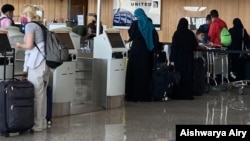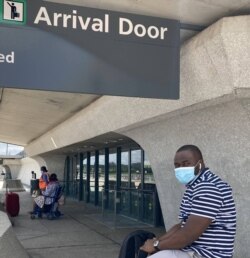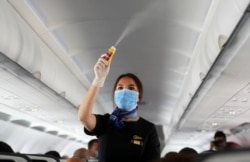Airline passenger travel in the United States plummeted more than 95% in April, as people stayed home because of concerns about contracting the highly infectious coronavirus on a plane or at the airport.
The number of people currently flying is still down about 75%.
This shows “traveler confidence is increasing in the United States,” said Joe Leader, CEO at the Airline Passenger Experience Association (APEX). But that is also a huge drop from “the typical 2.5 million passengers” at this time of the year, Leader told VOA.
Airlines have been disinfecting their planes, practicing social distancing and requiring passengers to wear masks.
Aviation analyst Seth Kaplan said as soon as the airlines required masks, people started flying again.
Bill Lentsch, chief customer experience officer for Delta Airlines, told VOA that the company is keeping its flight no more than 60% full. He said Delta was blocking the middle seats, which will likely extend past the end of September, because “having space between you and the next flyer does make a difference” in safety.
At Dulles International Airport outside of Washington, D.C., Francis Massaquoi arrived on a United Airlines flight from Chicago. It was the first time he had flown since the pandemic began in March, and he said he was nervous. But once he got on the plane, he said, he felt more secure with everyone wearing masks.
Sue Choi, a law student who flew into Dulles on Korea Air, said she was a “little scared. I’m only traveling now because I absolutely have to,” she said, “but I don’t feel comfortable with it.”
Kaplan explained that a lot of business travel has stopped, and most people are visiting friends and relatives.
People like Donald MacCormack, 79, who was at Dulles flying to Texas after visiting his daughter in Virginia. He said he also has not been comfortable flying.
“I’m wiping down my seat,” he said, as he was about to board a flight to Houston. And “I’ve got a ticket in first class, so I can get on and off quickly.”
While many people are apprehensive about flying, others feel safe. John Regan, who traveled for work, said the efforts the airlines are taking to disinfect everything “gives me a level of comfort.”
The airlines, meanwhile, are trying to woo back the public by reassuring them that it is safe to fly.
Airlines for America, a lobbying group representing major North American airlines, said in a statement that the airlines are using “HEPA filters, which help generate hospital-grade air quality.”
Lentsch said he expects the safety measures that Delta is taking will be permanent.
Leader agreed.
“Cleanliness will be a long-term philosophy for the airlines,” APEX’s CEO said.
But Douglas Kidd, founder of the National Association of Airline Passengers, an advocacy group near Washington, D.C., is concerned that most airlines will return to “business as usual” sooner rather than later, which includes packing the planes with passengers.
That’s a worry for passenger John Nichols, who was about to fly from Dulles to Boston for a friend’s wedding.
“I’m taking all the precautions I already can,” he said, which included a coronavirus test a few days before his flight.
The demand for air travel is slowing again due to travel restrictions by some states and because coronavirus cases are surging in parts of the U.S.
Jennifer Rockwell of Alexandria, Virginia, said she is not planning to fly anytime soon, especially to California, a current coronavirus hot spot, where her parents live. She said she plans to hold off on flying until there is a vaccine for the coronavirus.
According to Airlines for America, people will be reluctant to travel until there is “a strong degree of confidence that the health crisis is behind us.”
Even if that happens, Lentsch said, it is going to be at least a couple of years before air travel gets back to anywhere near normal.







